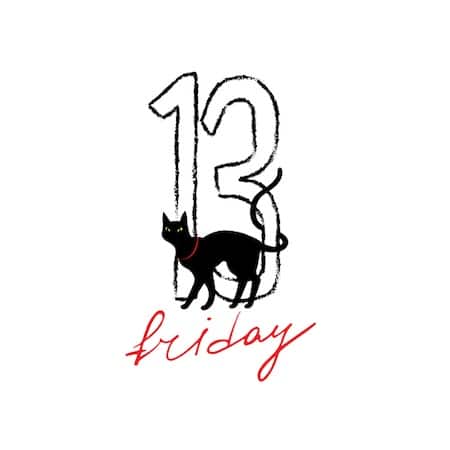Szia,
Ma tovább folytatjuk a napi leckékkel és most, péntek 13-ra való tekintettel egy kis olvasmányt hozok neked szószedettel és audióval erről a napról.
A karácsonyi ajándékokkal kapcsolatban is van egy tippem számodra: használd az 50% engedményt adó kuponkódot, amely érvényes szinte minden videókurzusra (örökös hozzáféréssel), ráadásul számos könyv és kártya is kedvezménnyel kapható most.

KUPONKÓD: christmas2024
Ezt kell vásárlás végén begépelned, hogy az 50% kedvezményt érvényesíteni tudd! Remélem találsz valami kedvedre valót!
Ne feledd, hogy ma este pedig ismét egy ÉLŐ adással jelentkezem, egy interaktív interjút hozunk Dezsényi Istvánnal, az ORIGÓ Idegennyelvi Centrum vizsgáztatójával, ahol te is kérdezhetsz a “Rigó utcai” nyelvvizsgákkal kapcsolatban.

NÉZNI FOGOM AZ ÉLŐ ADÁST: ITT
Most pedig nézzük a leckét!
Üdv,
Nóri
MAI LECKE
FRIDAY, 13TH

Nézd meg a szöveg folytatását, hanganyaggal és szószedettel: ITT
Friday the 13th is thought by many to be the unluckiest day in the Gregorian calendar. Here are 13 facts about this day of ill repute.
1. It’s Unclear Why It Is Feared
Very little is known about the origins of the day’s notoriety. Some historians believe that the superstitions surrounding it arose in the late 19th century. The first documented mention of the day can be found in a biography of Italian composer Gioachino Rossini, who died on a Friday the 13th. A 1907 book, Friday the Thirteenth, by American businessman Thomas Lawson, may have further perpetuated the superstition.
Others believe that the myth has Biblical origins. Jesus was crucified on a Friday, and there were 13 guests at the Last Supper the night before his crucifixion.
Another account suggests that the day has been associated with misfortune since 1307 when on a Friday the 13th, the French king gave the orders to arrest hundreds of Knights Templar in France.
2. Yet, the Fear Is Very Real
So real that one scientific name wasn’t enough. The fear of Friday the 13th is also called friggatriskaidekaphobia or paraskevidekatriaphobia.
Friggatriskaidekaphobia comes from Frigg, the Norse goddess of wisdom after whom Friday is named, and the Greek words triskaideka, meaning 13, and phobia, meaning fear. Paraskevidekatriaphobia is also derived from Greek: paraskeví translates as Friday, and dekatria is another way of saying 13.
3. …And Very Common!
Experts say that friggatriskaidekaphobia affects millions of people and estimate that businesses, especially airlines, suffer from severe losses on Friday the 13th.
Triskaidekaphobia, or the fear of the number 13, is even more widespread. So much so that many high-rise buildings, hotels, and hospitals skip the 13th floor, and many airports do not have gates numbered 13. In many parts of the world, having 13 people at the dinner table is considered bad luck.
4. Friday the 13th Can Come in Threes
A bit of bad news for all of you who suffer from friggatriskaidekaphobia – all years will have at least one Friday the 13th. The good news is that there cannot be more than three Friday the 13ths in any given calendar year. The longest one can go without seeing a Friday the 13th is 14 months.
5. Blame Sunday
For a month to have a Friday the 13th, the month must begin on a Sunday.



